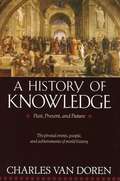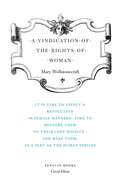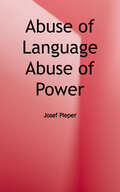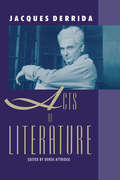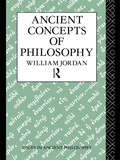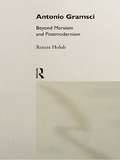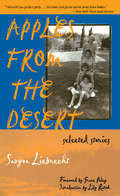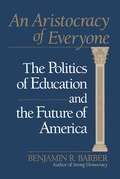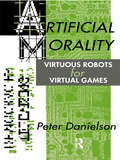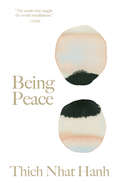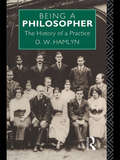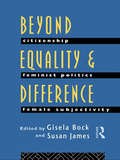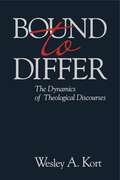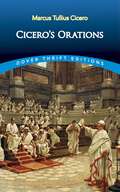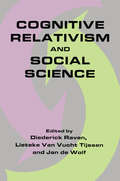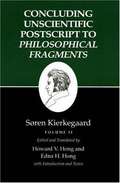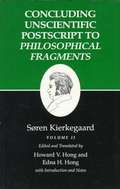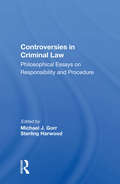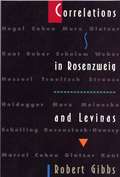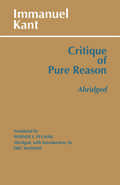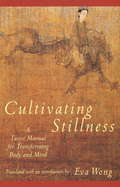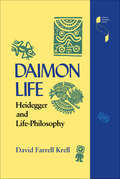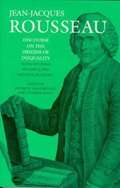- Table View
- List View
A History of Knowledge: Past, Present, and Future
by Charles Van DorenA one-volume reference to the history of ideas that is a compendium of everything that humankind has thought, invented, created, considered, and perfected from the beginning of civilization into the twenty-first century. Massive in its scope, and yet totally accessible, A HISTORY OF KNOWLEDGE covers not only all the great theories and discoveries of the human race, but also explores the social conditions, political climates, and individual men and women of genius that brought ideas to fruition throughout history. "Crystal clear and concise... Explains how humankind got to know what it knows." Clifton Fadiman.
A Vindication of the Rights of Woman
by Mary WollstonecraftFirst published in 1792, A Vindication of the Rights of Woman was an instant success, turning its thirty-three-year-old author into a minor celebrity. A pioneering work of early feminism that extends to women the Enlightenment principle of "the rights of man," its argument remains as relevant today as it was for Woll-stonecraft's contemporaries. "Mary Wollstonecraft was not the first writer to call for women to receive a real, challenging education," writes Katha Pollitt in the new Introduction. "But she was the first to connect the education of women to the transformation of women's social position, of relations between the sexes, and even of society itself. She was the first to argue that women's intellectual equality would and should have actual consequences. The winds of change sweep through her pages." This classic work of early feminism remains as relevant and passionate today as it was for Wollstonecraft's contemporaries. This edition includes new explanatory notes.From the Trade Paperback edition.
Abuse of Language, Abuse of Power
by Josef PieperOne of the great Catholic philosophers of our day reflects on the way language has been abused so that, instead of being a means of communicating the truth and entering more deeply into it, and of the acquisition of wisdom, it is being used to control people and manipulate them to achieve practical ends. Reality becomes intelligible through words. Man speaks so that through naming things, what is real may become intelligible. This mediating character of language, however, is being increasingly corrupted. Tyranny, propaganda, mass-media destroy and distort words. They offer us apparent realities whose fictive character threatens to become opaque. Josef Pieper shows with energetic zeal, but also with ascetical restraint, the path out of this dangerous situation. We are constrained to see things again as they are and from the truth thus grasped, to live and to work.
Acts of Literature
by Jacques DerridaFirst published in 1992. "Acts of Literature", compiled in close association with Derrida, brings together for the first time a number of Derrida's writings on literary texts on the question of literature. The essays discuss literary figures such as Rousseau, Mallarme, Joyce, Shakespeare and Kafka. Comprising pieces spanning Derrida's career, the collection includes a substantial new interview with him on questions of literature, deconstruction, politics, feminism and history. Derek Attridge provides an introductory essay on deconstruction and the question of literature, and offers suggestions for further reading. These essays examine the place and function of literature in Western culture. They highlight Derrida's interest in literature as a significant cultural institution and as a peculiarly challenging form of writing, with inescapable consequences for our thinking about philosophy, politics and ethics. This book should be of interest to undergraduates and academics in the field of literary theory and criticism and continental philosophy.
Ancient Concepts of Philosophy (Issues in Ancient Philosophy)
by William JordanFirst published in 1993. Routledge is an imprint of Taylor & Francis, an informa company.
Antonio Gramsci: Beyond Marxism and Postmodernism (Critics of the Twentieth Century)
by Renate HolubThis book provides the first detailed account of Gramsci's work in the context of current critical and socio-cultural debates. Renate Holub argues that Gramsci was ahead of his time in offering a theory of art, politics and cultural production. Gramsci's achievement is discussed particularly in relation to the Frankfurt School (Adorno, Horkheimer, Benjamin, Bloch, Habermas), to Brecht's theoretical writings and to thinkers in the phenomenological tradition especially Merleau-Ponty. She argues for Gramsci's continuing relevance at a time of retreat from Marxist positions on the postmodern left. Antonio Gramsci is distinguished by its range of philosophical grasp, its depth of specialized historical scholarship, and its keen sense of Gramsci's position as a crucial figure in the politics of contemporary cultural theory.
Apples from the Desert
by Grace Paley Savyon LiebrechtSavyon Liebrecht's intense, lyrical, and emotionally complex stories have made her a best-selling writer in her native Israel. Her short fiction explores the everyday tragedies that emanate from strained relationships between Arabs and Jews, women and men, older and younger generations in present-day Israel. According to the Washington Post Book World, her "engrossing and skillful tales take you through the lives of real people, to the heart of their emotional and moral being." Liebrecht reveals the impact of larger social and political conflicts within the private world of the home with a precision and a subtle ferocity reminiscent of the work of Nadine Gordimer. "These finely wrought stories of private lives shed light on a terrifying political conflict", notes the New York Times Book Review. "[Liebrecht] takes you places you've never been before." The Helen Rose Scheuer Jewish Woman's Series
Aristocracy of Everyone
by Benjamin BarberIn this brilliant, controversial, and profoundly original book, Benjamin R. Barber fundamentally alters the terms of the current debate over the value of opportunity in American education, politics, and culture.Barber argues that the fashionable rallying cries of cultural literacy and political correctness completely miss the point of what is wrong with our society. While we fret about "the closing of the American mind" we utterly ignore the closing of American schools. While we worry about Japanese technology, we fail to tap the more fundamental ideological resources on which our country was founded. As Barber argues, the future of America lies not in competition but in education. Education in America can and must embrace both democracy and excellence.Barber demonstrates persuasively that our national story has always comprised an intermingling of diverse, contradictory, often subversive voices. Multiculturalism has, from the very start, defined America. From his gripping portrait of America poised on the brink of unprecedented change, Barber offers a daringly original program for effecting change: for teaching democracy depends not only on the preeminence of education but on a resurgence of true community service.A ringing challenge to the complacency, cynicism, and muddled thinking of our time that will change the way you feel about being an American citizen.
Artificial Morality: Virtuous Robots for Virtual Games
by Peter DanielsonThis book explores the role of artificial intelligence in the development of a claim that morality is person-made and rational. Professor Danielson builds moral robots that do better than amoral competitors in a tournament of games like the Prisoners Dilemma and Chicken. The book thus engages in current controversies over the adequacy of the received theory of rational choice. It sides with Gauthier and McClennan, who extend the devices of rational choice to include moral constraint. Artificial Morality goes further, by promoting communication, testing and copying of principles and by stressing empirical tests.
Being Peace: Classic Teachings From The World's Most Revered Meditation Master (Thich Nhat Hanh Classics)
by Thich Nhat HanhBeing Peace is a timeless and eloquent introduction t Zen Master Thich Nhat Hanh and his most important teachings. First published in 1987 and translated into more than thirty languages, this spiritual classic reveals the connection between our own personal happiness and the state of the world around us. Thich Nhat Hanh’s key practices are resented in simple and clear language, offering practical suggestions for how to create a more peaceful world "right in the moment we are alive." Being Peace is a must-have for those interested in Buddhist practice and a perfect starting point for anyone concerned about how to create peace in themselves and the world.
Being a Philosopher: The History of a Practice
by David W. HamlynFirst Published in 2004. Routledge is an imprint of Taylor & Francis, an informa company.
Beyond Equality and Difference: Citizenship, Feminist Politics and Female Subjectivity
by Susan James Gisela BockHistorically, as well as more recently, women's emancipation has been seen in two ways: sometimes as the `right to be equal' and sometimes as the `right to be different'. These views have often overlapped and interacted: in a variety of guises they have played an important role in both the development of ideas about women and feminism, and the works of political thinkers by no means primarily concerned with women's liberation. The chapters of this book deal primarily with the meaning and use of these two concepts in the context of gender relations (past and present), but also draw attention to their place in the understanding and analysis of other human relationships.
Bound to Differ: The Dynamics of Theological Discourses (G - Reference, Information and Interdisciplinary Subjects)
by Wesley A. KortIn this analysis of theological conflict, Wesley Kort treats theologies as discourses that generate power and significance by their relations to and differences from one another. He identifies the traditional or putative claims of theological power and meaning—sources, referents, and patterns or structures—as distractions from or even concealments of the discursive situation in which theologies arise.Kort first describes the dynamics of difference and conflicts constituted by theologies and the importance of power for opposing theologies. He provides a model that demonstrates why differences and conflicts, rather than occasional or peripheral effects of theology, are required as central causes. He then applies the analysis and model in the task of reading theologies of more than a dozen modern and contemporary figures.In his conclusion, Kort returns to the cultural situation he sketched at the beginning, one that creates the conditions for the study and that is often called "postmodern." Kort calls it "a culture of scripture and belief," and he discusses prospects for theology in a culture not characterized by the fact and certainty. "The culture of scripture and belief" calls for theologies that are both forceful and vulnerable to critique.
Cicero's Orations: In Catilinam I-iv, Pro Caelio, Pro Milone, Pro Archia (Dover Thrift Editions)
by Marcus Tullius Cicero Charles Duke YongeThe greatest orator of the late Roman Republic, Marcus Tullius Cicero (106–43 B.C.), influenced the course of European letters for centuries after his death. Through his writings, Renaissance and Enlightenment scholars encountered the riches of Classical rhetoric and philosophy. The elegance of his style, his skill and erudition, his worldly wisdom, and his profound humanity made Cicero a model for latter-day thinkers and keep his works ever relevant. This collection presents examples of rhetoric from throughout the ancient Roman's illustrious career. Selections include a series of famous speeches delivered during Cicero's term as consul which thwarted the Catiline conspiracy to overthrow the Republic — but led to his own prosecution and exile. The compilation concludes with the bold orations delivered in defiance of Marc Anthony, which sealed Cicero's doom.
Cognitive Relativism and Social Science
by Diederick RavenModern epistomology has been dominated by an empiricist theory of knowledge that assumes a direct individualistic relationship between the knowing subject and the object of knowledge. Truth is held to be universal, and non-individualistic social and cultural factors are considered sources of distortion of true knowledge. Since the late 1950s, this view has been challenged by a cognitive relativism asserting that what is true is socially conditioned. This volume examines the far-reaching implications of this development for the social sciences.Recently, cognitive relativism has become a key issue of debate in anthropology, philosophy, and sociology. In anthropology this is illustrated by a growing awareness of the similarity of all systems of knowledge. In philosophy it is exemplified by the realization that traditional monolithic and absolutist concepts of truth have increasingly lost any power to make sense and to convince. In sociology it is visible in a renewal of interest in a general sociology of knowledge. Yet, in spite of this convergence of interests, practitioners of these three disciplines have on the whole shown no inclination to reach a consensus on the terms of reference that could facilitate an interdisciplinary approach.Cognitive Relativism and Social Science aims to do just this. It is a working assumption of this volume that, as far as the subject of cognitive relativism is concerned, anthropologists, philosophers, and sociologists should join forces rather than try to deal with the challenges of cognitive relativism within strictly imposed boundaries that normally separate academic disciplines. Only when they work together will it be possible to treat the problems posed by cognitive relativism in an adequate way. This volume provides the results of attempts to communicate on cognitve relativism across disciplinary boundaries. This is must reading in the philosophy of social science and in social research theory.
Complexity: The Emerging Science at the Edge of Order and Chaos
by M. Mitchell WaldropWhy did the stock market crash more than 500 points on a single Monday in 1987? Why do ancient species often remain stable in the fossil record for millions of years and then suddenly disappear? In a world where nice guys often finish last, why do humans value trust and cooperation? At first glance these questions don't appear to have anything in common, but in fact every one of these statements refers to a complex system. The science of complexity studies how single elements, such as a species or a stock, spontaneously organize into complicated structures like ecosystems and economies; stars become galaxies, and snowflakes avalanches almost as if these systems were obeying a hidden yearning for order.
Concluding Unscientific Postscripts to Philosophical Fragments (Volume I, Text)
by Howard V. Hong Edna H. Hong Søren KierkegaardIn Philosophical Fragments the pseudonymous author Johannes Climacus explored the question: What is required in order to go beyond Socratic recollection of eternal ideas already possessed by the learner? Written as an afterword to this work, Concluding Unscientific Postscript is on one level a philosophical jest, yet on another it is Climacus's characterization of the subjective thinker's relation to the truth of Christianity. At once ironic, humorous, and polemical, this work takes on the unscientific form of a mimical-pathetical-dialectical compilation of ideas. Whereas the movement in the earlier pseudonymous writings is away from the aesthetic, the movement in Postscript is away from speculative thought. Kierkegaard intended Postscript to be his concluding work as an author. The subsequent second authorship after The Corsair Affair made Postscript the turning point in the entire authorship. Part One of the text volume examines the truth of Christianity as an objective issue, Part Two the subjective issue of what is involved for the individual in becoming a Christian, and the volume ends with an addendum in which Kierkegaard acknowledges and explains his relation to the pseudonymous authors and their writings. The second volume contains the scholarly apparatus, including a key to references and selected entries from Kierkegaard's journals and papers.
Concluding Unscientific Postscripts to Philosophical Fragments (Volume II, Historical Introduction, Supplement, Notes, and Index)
by Howard V. Hong Edna H. Hong Søren KierkegaardIn Philosophical Fragments the pseudonymous author Johannes Climacus explored the question: What is required in order to go beyond Socratic recollection of eternal ideas already possessed by the learner? Written as an afterword to this work, Concluding Unscientific Postscript is on one level a philosophical jest, yet on another it is Climacus's characterization of the subjective thinker's relation to the truth of Christianity. At once ironic, humorous, and polemical, this work takes on the "unscientific" form of a mimical-pathetical-dialectical compilation of ideas. Whereas the movement in the earlier pseudonymous writings is away from the aesthetic, the movement in Postscript is away from speculative thought. Kierkegaard intended Postscript to be his concluding work as an author. The subsequent "second authorship" after The Corsair Affair made Postscript the turning point in the entire authorship. Part One of the text volume examines the truth of Christianity as an objective issue, Part Two the subjective issue of what is involved for the individual in becoming a Christian, and the volume ends with an addendum in which Kierkegaard acknowledges and explains his relation to the pseudonymous authors and their writings. The second volume contains the scholarly apparatus, including a key to references and selected entries from Kierkegaard's journals and papers.
Consciousness Reconsidered
by Owen FlanaganConsciousness is neither miraculous nor ultimately mysterious. In this broad, entertaining, and persuasive account, Flanagan argues that we are on the way to understanding consciousness and its place in the natural order. No aspect of consciousness escapes Flanagan's probe. Qualia, self-consciousness, disorders such as blindsight, various kinds of amnesia, and multiple personalities all find a place in this powerful synthetic theory that contends that consciousness is real, plays an important causal role, and resides in the brain.
Controversies In Criminal Law: Philosophical Essays On Responsibility And Procedure
by Michael J. Gorr Sterling HarwoodWhen philosophers have turned their attention to criminal law, they have tended to emphasize problems about the criminalization of acts and the justification for the punishment of those who commit such acts. But there has been a recent wave of significant and exciting philosophical work on issues surrounding two other topics in criminal law: Given the performance of a criminal act, what establishes criminal? And what should the state be allowed to use in trying to establish liability? In this carefully edited volume, Michael J. Gorr and Sterling Harwood present a generous selection of papers representing the best of this new work. Avoiding overly abstract pieces in favor of essays that highlight both the philosophical questions and what actually happens on the street and in the courtroom, they have produced a book that is accessible and relevant to the concerns of students. Controversies in Criminal law is an innovative and useful contribution to the teaching of philosophy of law and the foundations of criminal justice. It will be widely used in philosophy departments, law schools, and schools of criminal justice.
Correlations in Rosenzweig and Levinas
by Robert GibbsRobert Gibbs radically revises standard interpretations of the two key figures of modern Jewish philosophy--Franz Rosenzweig, author of the monumental Star of Redemption, and Emmanuel Levinas, a major voice in contemporary intellectual life, who has inspired such thinkers as Derrida, Lyotard, Irigaray, and Blanchot. Rosenzweig and Levinas thought in relation to different philosophical schools and wrote in disparate styles. Their personal relations to Judaism and Christianity were markedly dissimilar. To Gibbs, however, the two thinkers possess basic affinities with each other. The book offers important insights into how philosophy is continually being altered by its encounter with other traditions.
Critique of Pure Reason, Abridged
by Immanuel Kant Eric Watkins Werner S. PluharThis thoughtful abridgment makes an ideal introduction to Kant's Critique of Pure Reason. Key selections include: the Preface in B, the Introduction, the Transcendental Aesthetic, the Second Analogy, the Refutation of Idealism, the first three Antinomies, the Transcendental Deduction in B, and the Canon of Pure Reason. A brief introduction provides biographical information, descriptions of the nature of Kant's project and of how each major section of the Critique contributes to that project. A select bibliography and index are also included.
Cultivating Stillness
by Eva WongEquanimity, good health, peace of mind, and long life are the goals of the ancient Taoist tradition known as "internal alchemy," of which Cultivating Stillness is a key text. Written between the second and fifth centuries, the book is attributed to T'ai Shang Lao-chun--the legendary figure more widely known as Lao-Tzu, author of the Tao-te Ching . The accompanying commentary, written in the nineteenth century by Shui-ch'ing Tzu, explains the alchemical symbolism of the text and the methods for cultivating internal stillness of body and mind. A principal part of the Taoist canon for many centuries, Cultivating Stillness is still the first book studied by Taoist initiates today.
Daimon Life: Heidegger and Life-Philosophy (Studies in Continental Thought)
by David Farrell Krell"Daimon Life is life-enchancing. To read it is to become richer in wor(l)d." –John LlewelynDisclosure of Martin Heidegger's complicity with the National Socialist regime in 1933-34 has provoked virulent debate about the relationship between his politics and his philosophy. Did Heidegger's philosophy exhibit a kind of organicism readily transformed into ideological "blood and soil"? Or, rather, did his support of the Nazis betray a fundamental lack of loyalty to living things? David Farrell Krell traces Heidegger's political authoritarianism to his failure to develop a constructive "life-philosophy"—his phobic reactions to other forms of being. Krell details Heidegger's opposition to Lebensphilosophie as expressed in Being and Time, in an important but little-known lecture course on theoretical biology given in 1929–30 called "The Basic Concepts of Metaphysics," and in a recently published key text, Contributions to Philosophy, written in 1936–38. Although Heidegger's attempt to think through the problems of life, sexual reproduction, behavior, environment, and the ecosystem ultimately failed, Krell contends that his methods of thinking nonetheless pose important tasks for our own thought. Drawing on and away from Heidegger, Krell expands on the topics of life, death, sexuality, and spirit as these are treated by Freud, Nietzsche, Derrida, and Irigaray. Daimon Life addresses issues central to contemporary philosophies of politics, gender, ecology, and theoretical biology.
Discourse On The Origin Of Inequality, Polemics, And Political Economy
by Jean-Jacques Rousseau Judith R. Bush Terence Marshall Christopher Kelly Roger D. MastersIncludes the Second Discourse (complete with the author’s extensive notes), contemporary critiques by Voltaire, Diderot, Bonnet, and LeRoy, Rousseau’s replies (some never before translated), and Political Economy, which first outlined principles that were to become famous in the Social Contract. This is the first time that the works of 1755 and 1756 have been combined with careful commentary to show the coherence of Rousseau’s “political system. ” The Second Discourse examines man in the true “state of nature,” prior to the formation of the first human societies, tracing the “hypothetical history” of political society and social inequality as they developed out of natural equality and independence.
